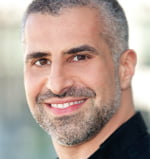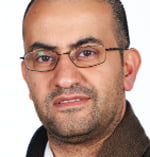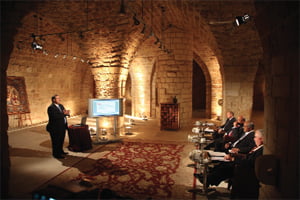Springtime for MENA
Producers from the Middle East and North Africa, as in most areas, are developing formats for the global marketplace. But is the region’s TV landscape right for such a move, asks Ed Waller.

Arab Idol
The Middle East and North Africa (MENA) region has long been a major importer of television formats, and everything from Pop Idol to Who Wants to be a Millionaire? has been locally produced.
Sure, there are certain cultural issues that limit the kinds of formats that are licensed in this region – “We won’t be pitching any dating shows for the foreseeable future,” says SPT Arabia president Ziad Kebbi – but the market is certainly embracing talent competitions and gameshows, and even sitcoms are being reworked with local talent.
But look closely and you’ll see the green shoots of development of home-grown formats that MENA producers are not only hoping to clear within the region but also internationally. If formats from Israel, Colombia and Japan can get into US network primetime, why can’t those from Abu Dhabi, Lebanon or Egypt?
“Formats have always tended to be created in the developed markets before travelling to the developing ones but there have been exceptions. There is no reason why the same cannot happen in the MENA region,” says Lara el Haddad, MD of Beirut-based Endemol Middle East. “Lately, format sellers have seen increasing interest in local content for local channels and that could be an indication of where the market is heading,” she says, adding that as well as drawing on the huge Endemol catalogue, she is “developing a variety of entertainment and gameshows that we believe have great potential internationally.”
“We’ve been developing our own IP since day one,” adds Kebbi, who launched Sony-backed SPT Arabia in 2010 and quickly landed a deal to adapt US sitcom Everybody Loves Raymond for Dream TV in Egypt, Murr TV in Lebanon and Saudi Arabian IPTV service Intigral. “We have the advantage of the Sony catalogue but we also develop our own formats that we try to make as universal as possible.”

Ziad Kebbi
Local development was also at the heart of UK indie Twofour’s launch of a prodco in Abu Dhabi in 2010, in partnership with media development agency Twofour54. “We see the Emiratisation of Twofour Arabia as a crucial part of the plan,” says the subsidiary prodco’s general manager Jonney Steven. “This year, we’ll be exploring the possibility of launching internships to send Emirati producers to the UK to see how we develop and produce programmes there.”
Steven says Twofour Arabia is developing its parent’s UK formats for the Middle East, such as Channel 5 reality show The Hotel Inspector and Channel 4 series Educating Essex, but emphasises that upskilling local producers is a priority and says he wants to turn the company into a production hub for TV channels not only in the UAE but also Saudi Arabia and Qatar.
Twofour54 has also attracted other producers to set up shop in Abu Dhabi. Lebanon’s Charisma TV expanded into the Gulf emirate in 2010 and has local development front of mind; and Comedy Central Studios Arabia (CCSA) was set up in 2009 and won its first commission, locally developed sketch series Street of Laughter, picked up by Abu Dhabi TV last year and is busy developing original comedy gameshows.
Pyramedia is another MENA prodco that has not only teamed up with Twofour54 in Abu Dhabi but also has production arms in Cairo and Riyadh. The company’s poetry talent show Million’s Poet has chalked up five seasons on Abu Dhabi TV and has been adapted by BBC Radio 3.
Pyramedia CEO Nashwa Al Ruwaini says: “I was one of the first people to introduce formats into the Middle East, with Millionaire for MBC over 10 years ago. Arabising formats was just the first step. The second was developing our own, which we are doing now, and the third is developing a Middle Eastern market for formats. Maybe the next big hit on one of the UK channels will be a format from the Middle East.”
But is the MENA television environment helping or hindering the export of IP from the region? Like other emerging markets, there is a high level of vertical integration at its broadcasters, which is just one issue facing indie prodcos hoping to develop hits they can then export as formats.
Vertical integration “has been in place in the MENA region since the very beginning, with broadcasters fully engaged in production,” says El Haddad. “However, demand for new ideas, production quality and interest in overseas formats have seen broadcasters increasingly turning to international production companies that not only own hit content but can also deliver high standards of production.”

Ihab Hammoud
SPT Arabia’s Kebbi says the high levels of vertical integration mean “we end up competing with the broadcasters’ internal production arms. Eventually, they’ll realise there’s no point having such strong production arms when there are so many independent players.”
The real issue for MENA indies, Kebbi says, is that IP rights are treated so differently throughout the region. “It’s a big region and every country has different laws relating to IP,” he says. “In the UAE and Lebanon, IP laws are enforced but in all the other countries they are poorly enforced. Some don’t even have any IP laws.” Retaining format rights, he adds, simply depends on how big you are.
For Ihab Hammoud, general manager at Beirut-based production outfit InMedia, the TV landscape is stacked against the indie producer and it is getting worse, not better. “Everything is stopping MENA formats from becoming global franchises,” he says.
Hammoud, whose company makes local adaptations like Arab Idol for MBC1, Dragons’ Den for Future TV and The Phone for Abu Dhabi TV, blames the creation of various Media Free Zones around the region, which led to a sharp growth in the number of free-to-air channels. “This should’ve been great news for content providers. On the contrary, it widened the gap between the professional broadcasting businesses and amateur, unprofessional and improperly funded channels and productions,” he argues.

Dragons' Den on Future TV
This, he continues, led to increased audience fragmentation and lots of low-cost channels with even lower budgets. In turn, this forced indie producers, apart from a few international prodcos, into cheaper and faster productions. As a result, indies “rarely see any funding for development or for the production of pilots,” both of which are crucial to developing formats for export.
“With the creation of a healthy, regulated environment for TV broadcasters – including budgets, quotas for local production and higher production standards – not to mention advertising growth and political stability, local producers and developers here can start exporting their formats to international markets,” he says.
On the issue of political stability, the region has seen much upheaval in recent months, with the spread of the Arab Spring. On top of the political and social changes that have ensued, this has obviously affected the television industry too.
“It has led to a period of recession and broadcasters are naturally skewing toward news and political output. Second, the impact of the global financial crisis has been felt, with broadcasters tightening their cash flow and reducing budgets,” says el Haddad.
“It hasn’t been the ideal environment,” adds SPT Arabia’s Kebbi. “The markets aren’t behaving normally and viewers are getting a little tired of all the bloodshed and violence on TV.” This is changing the kinds of shows channels are commissioning. “It’s now all about feelgood TV,” Kebbi explains, “Aspirational gameshows, talent shows that motivate the population and comedy are in demand. People want to be entertained.”
This has led to explosive growth in stand-up comedy, something that is new to the region. “Traditionally, it’s not part of the local culture but it’s springing up in places like Lebanon, Egypt and the UAE,” adds Kebbi. Like CCSA, SPT Arabia is now developing some original comedy shows.
But as well as soft IP laws, political instability and vertically integrated broadcasters, indie producers in MENA have another issue to deal with: the arrival of global production groups. Naturally, executives from Endemol and SPT say this is a good thing. “International producers have been a major catalyst for growth, development and innovation in the MENA media market. They have introduced creativity and expertise along with a greater diversity of formats and genres,” says el Haddad.
Kebbi believes the arrival of the majors “encouraged people to start their own production companies in order to become acquisition targets for the bigger companies,” but says this led to so many prodcos being launched that the market wasn’t developed enough to support them all. “Now some of them are facing problems,” he admits.
Not being part of a global production group, InMedia’s Hammoud sees things differently. “The impact of the international groups on local MENA indies is on two levels: cutting off our access to major formats and big catalogues; and secondly, we now have bigger competitors with international support and an exclusive catalogue.”
His response to these two challenges is to hire international production experts to work on his format adaptations and to upskill his producers. “This exchange of experience is helping in shaping our local crews’ experience and allowing them to treat productions in a wider scope.”
Hammoud and others like him might not like the competition but it, alongside the possible introduction of some pro-producer regulations, might be what allows him to turn one of his domestic formats into an international hit.















.jpg)




























